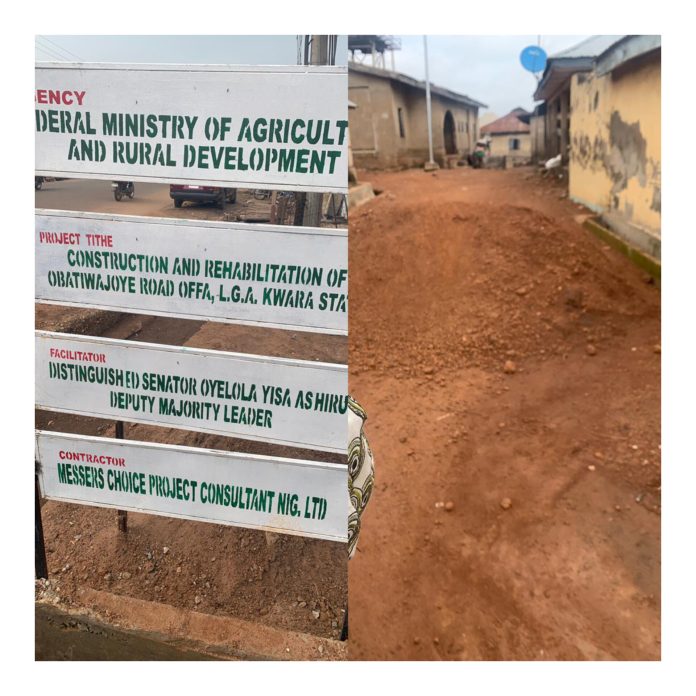By Habeeb Olokooba
Sometimes around June, it was a breezy morning, the freshness of the previous day’s rainfall in the air. Riding through the refreshing breeze was Abdulwasiu Dada, a bike man in his late 40s whose only source of income came from his reliable Bajaj bike.
Dada, a former small-scale farmer, thought back on his previous existence and remembered the fateful day that altered everything. Like many farmers, he was eager to sell his harvest. After carefully loading his priceless yams onto a tray and securing them to the back of his bike, he left for the “Owode” market.
Approaching the bustling market, tragedy struck — a car collided with him, shattering his dream and forcing him to drive to a new livelihood.
“Little did I know that a different fate awaits me. I was driving on the Olofa way express, when I saw a hectic go slow. I had to hold out for the queue to clear. While we were in the hold-up, a car struck my bike and knocked me down,” Dada said.
“I sustained a minor injury on my arm, and my machine became faulty. The most painful part was that all the yams I carried broke into pieces making them lose their value. I had to sell them at an unfavorable price.”
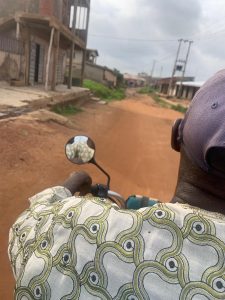
Dada expressed regret, saying that since the accident, he has been discouraged and has settled for a career in transportation. “Planting is not really the business; most of the time, the issue is getting that road to market.” It is usually busy that way, especially on market days,” he bemoaned.
Over 23% of Nigeria’s GDP comes from agriculture, which also employs over 34% of the country’s labor force. As such, access to road networks is crucial. Farmers in rural areas are affected by the lack of accessing good roads to transport their goods to the available markets in the community, leading to loss of perishable farm produce.
Nigeria’s agriculture industry has faced significant challenges due to the lack of basic infrastructure, including reliable transportation and insufficient systems.
Abdulwasiu Dada is one of the numerous Nigerian farmers who endure difficult circumstances when bringing their produce to market. It is claimed that a number of factors, including inadequate funding and restricted access to farm-to-market roads, are making food security in Nigeria worse. As a result, food prices rise, inflation rises, and Nigeria’s poverty rate rises.
Similar to Abdulwasiu’s plight, Suleiman Abdulmalik is a living witness of how busy Olofa Expressway used to be, especially during working days. Now a student at Usmanu Danfodiyo University, but while he was still in Secondary school, he normally faced difficulty while heading to his school every morning.
“I was known as a habitual latecomer because the traffic jam I encountered on that road would surely make you late,” Abdulmalik said
There are rural roads that could ease the jam on this way, however these roads are full of portholes, and road users do not really use them like the express,” he further explained.
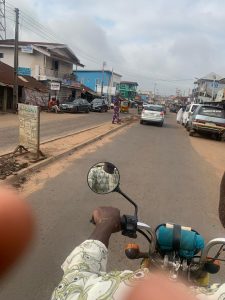
Glimmer of Hope
Situated on Esuwoye Street in Offa, the Obatiwajoye rural road was intended to alleviate traffic congestion on the Olofa expressway. Despite this objective, the road remains untarred and recently developed numerous potholes.
To address the challenges road users face, a project under the Federal Government Consolidated Projects was initiated in 2023 by Senator Oyelola Yisa Ashiru, representing Kwara South. The project, titled “Construction and Rehabilitation of Obatiwajoye Road Offa,” was awarded to Messers Choice Project Consultant NIG. LTD, with a budget of 150 million Naira.
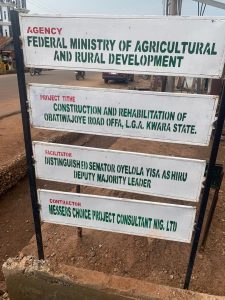
However, a visit to the location of this project revealed that some work has been done, which includes, filling the road with sand and grading, and a gutter has also been constructed. However, work was completely stopped when this reporter visited the project location in June. A remnant of sand, used in filling the road, was left of the road making it difficult for vehicles to use the road.
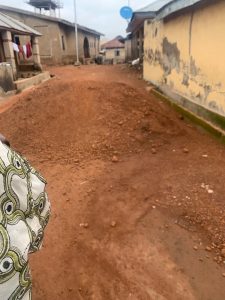
Sand Remnant Left at the Project Site — PC: Habeeb Olokooba
According to residents, work stopped over a month back and the contractor is yet to return to site.
“If not that you said there is a project awarded for the construction of this road, I don’t even know. Because the road is usually graded every year and when I saw them filling it, I thought it was a normal yearly routine,” Abdulmalik pointed out.
Contractor Details Not Available
When this reporter checked for the availability of Messers Choice Project Consultant Nigeria Limited on the Corporate Affairs Commission’s Portal, the details returned void. Further search on Ng Check revealed there was a company with the name Choice Project Consultant (Nig.) Ltd registered in 2010 and the activities unspecified. However, it is doubtful whether Messers Choice is the same as Choice. However, even the latter company’s status was said to be unknown on NG Check.

Project facilitator remains unreachable
Several calls were made to Senator Oyelola, who facilitated the project, but he neither picked up nor called back. A text message and email were also sent to him. As of the time of filing this story, he has yet to respond.
Road transport plays an important role in agricultural development —Expert
In an interview, Mr. Femi Babatunde, a renowned and experienced farmer, highlighted the importance of road transport in agricultural development.
He said, “Road transport plays a crucial role in agricultural development as it is the main means of transporting produce from farms to markets and urban communities.”
Mr. Babatunde further explained that road transport is essential for moving food from farms to homes and markets.
He noted that it creates a market for agricultural produce, fosters interaction between different regions, and opens new areas to economic focus.
He emphasized the complex relationship between transport and development, stating that transport is vital for any development to occur.
“In Nigeria, an inadequate transportation network poses a challenge to the agricultural sector, causing significant loss and damage to harvested produce each year. The food and transport markets largely depend on exchange rates and global oil market dynamics. A well-developed transport sector is key to efficient distribution of agricultural produce and enhancing productivity,” he added.
He stressed that a good road network is crucial for providing market linkages for rural farmers.
“Poor road infrastructure negatively impacts food production and distribution, as well as the overall development of rural areas.
Mr. Babatunde added that poor roads hinder access to financial assistance, training, education, clean water, health services, electricity, and schools, further impoverishing rural farmers.
Improving road conditions in rural areas would directly boost farmers’ productivity by facilitating the transport of farm materials and quick access to experts and extension workers. Better road access would allow farmers to prevent or control disease outbreaks and access improved crop varieties, resulting in higher yields and reduced losses.
He also emphasized that better road infrastructure would enable farmers to expand their farms and increase their outputs.
“Poor rural-urban connectivity often forces farmers to rely on middlemen who exploit them by buying produce at low rates and reselling at higher prices. Investment in rural infrastructure, including roads, would bridge the gap between rural and urban dwellers, encouraging industries to establish branches in rural areas and improving overall living conditions.
“Investment in good roads in rural areas can significantly enhance farmers’ income, promote agricultural-based industries, and establish financial institutions and recreational centers, thereby revitalizing rural environments,” he concluded.
This story was produced with support from the Wole Soyinka Centre for Investigative Journalism (WSCIJ) under the Collaborative Media Engagement for Development Inclusivity and Accountability Project (CMEDIA) funded by the MacArthur Foundation.


